Related Research Articles
Joel R. Primack is a professor of physics and astrophysics at the University of California, Santa Cruz and is a member of the Santa Cruz Institute for Particle Physics.

François, Baron Englert is a Belgian theoretical physicist and 2013 Nobel Prize laureate.
David Elazzar Kaplan is a theoretical particle physicist at the Johns Hopkins University.
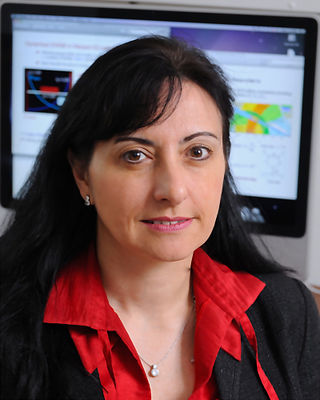
Marcela Silvia Carena Lopez is an Argentine theoretical physicist, and Distinguished Scientist at the Fermi National Accelerator Laboratory in Batavia, Illinois, where she is also head of the lab's Theory Division. She is also a professor at the University of Chicago, where she is a member of the Enrico Fermi Institute and the Kavli Institute for Cosmological Physics.
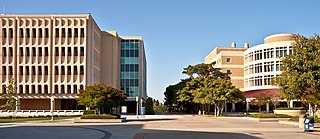
The School of Physical Sciences is an academic unit of the University of California, Irvine (UCI) that conducts academic research and teaching in the field of physical sciences. It offers both pre-professional training and general education in the departments of chemistry, earth system science, mathematics, and physics and astronomy. The school enrolls 1,400 undergraduate and graduate students and is one of the top schools in the nation in the number of degrees it confers in the area of physical sciences. It also offers specializations such as biochemistry, statistics, math for economics, applied and computational mathematics, astrophysics, applied physics, biomedical physics, and education. In 1995, the school gained international prominence when Frank Sherwood Rowland, a professor in chemistry and Frederick Reines, a professor in physics, won the Nobel Prize in their respective fields. It was the first time two people won the prize in the same year in two different fields at the same public university.
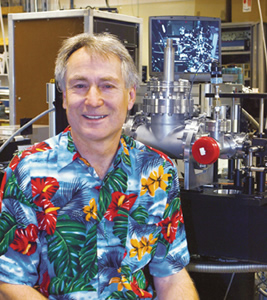
Richard James Saykally is an American chemist. He is currently the Class of 1932 Endowed Professor of Chemistry at the University of California, Berkeley. He has received numerous awards for his research on the molecular characteristics of water and aqueous solutions.
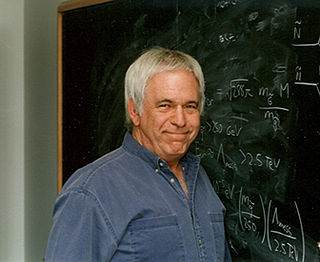
Gordon Leon Kane is Victor Weisskopf Distinguished University Professor at the University of Michigan and director emeritus at the Leinweber Center for Theoretical Physics (LCTP), a leading center for the advancement of theoretical physics. He was director of the LCTP from 2005 to 2011 and Victor Weisskopf Collegiate Professor of Physics from 2002 - 2011. He received the Lilienfeld Prize from the American Physical Society in 2012, and the J. J. Sakurai Prize for Theoretical Particle Physics in 2017.
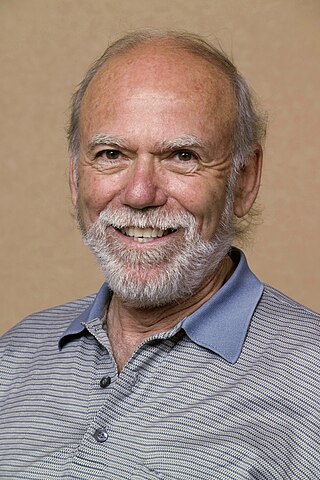
Barry Clark Barish is an American experimental physicist and Nobel Laureate. He is a Linde Professor of Physics, emeritus at California Institute of Technology and a leading expert on gravitational waves.
Norman Rostoker was a Canadian plasma physicist known for being a pioneer in developing clean plasma-based fusion energy. He co-founded TAE Technologies in 1998 and held 27 U.S. Patents on plasma-based fusion accelerators.
Karsten M. Heeger is a German–American physicist and Eugene Higgins Professor of Physics at Yale University, where he also serves as both chair of the Yale Department of Physics and director of Wright Laboratory. His work is primarily in the area of neutrino physics, focusing on the study of neutrino oscillations, neutrino mass, and dark matter.
Howard Eli Haber is an American physicist, specializing in theoretical elementary particle physics.
Daniel Nicholas McKinsey is an American experimental physicist. McKinsey is a leader in the field of direct searches for dark matter interactions, and serves as Co-Spokesperson of the Large Underground Xenon experiment. and is an Executive Committee member of the LUX-ZEPLIN experiment. He serves as Director and Principal Investigator of the TESSERACT Project, and is also The Georgia Lee Distinguished Professor of Physics at the University of California, Berkeley.
Oliver Keith Baker is an American experimental particle physicist and astrophysicist, best known for his work on the Higgs boson and dark matter. In 2002, he won the Edward Alexander Bouchet Award of the American Physical Society: "For his contribution to nuclear and particle physics; for building the infrastructure to do these measurements; and for being active in outreach activities, both locally and nationally."

Zuzanna Stefania Siwy is a Polish–American chemist at the University of California, Irvine. Her research considers synthetic nanopores and their application in ionic devices. She is a Fellow of the American Physical Society, American Association for the Advancement of Science and Foundation for Polish Science.
Iain William Stewart is a Canadian-American theoretical nuclear and particle physicist at the Massachusetts Institute of Technology, where he is the Otto and Jane Morningstar Professor of Science and the current Director of the MIT Center for Theoretical Physics (CTP). He is best known for his work on effective field theories and for developing the Soft Collinear Effective Theory (SCET).
Ali Yazdani is an American physicist who focuses on understanding new quantum phases of matter. He is currently the Class of 1909 Professor of Physics at Princeton University and the Director of the Princeton Center for Complex Materials, a material research science and technology (MRSEC) center supported by the National Science Foundation. Together with Seamus Davis, he is the recipient of the 2023 Buckley Prize from the American Physical Society.
Alice Louise Bean is an American physicist whose research concerns particle physics, and particularly particles beyond those predicted from the standard model of particle physics. She is a distinguished professor of physics at the University of Kansas.
Wendell Talbot Hill III is an American physicist and professor at the University of Maryland. His research career has largely focused on the intersection of laser physics and quantum science.
Clare C. Yu is an American theoretical biophysicist and condensed matter physicist. She is Professor of Physics and Astronomy in the School of Physical Sciences at the University of California, Irvine (UCI). She is a Fellow of the American Physical Society, of the American Academy of Arts and Sciences, and of the American Association for the Advancement of Science. She is also a former Alfred P. Sloan Fellow, and a current Trustee of the Aspen Center for Physics.
References
- ↑ https://faculty.sites.uci.edu/tait/curiculum-vitae/
- ↑ https://www.aps.org/programs/honors/fellowships/archive-all.cfm?initial=&year=2013&unit_id=DPF&institution=University+of+California%2C+Irvine
- ↑ https://www.humboldt-foundation.de/en/connect/explore-the-humboldt-network/singleview?tx_rsmavhsolr_solrviewhumboldtians%5BpPersonId%5D=1187475&cHash=115860432135d69a044372f0f17baca0
- ↑ https://engage.aps.org/dpf/honors/prizes-awards/mentoring-award
- ↑ https://senate.uci.edu/distinguished-faculty-awards/2019-2020-distinguished-faculty-awards/
- ↑ https://mathscinet.ams.org/mathscinet/freetools/collab-dist?source=665515&target=189017